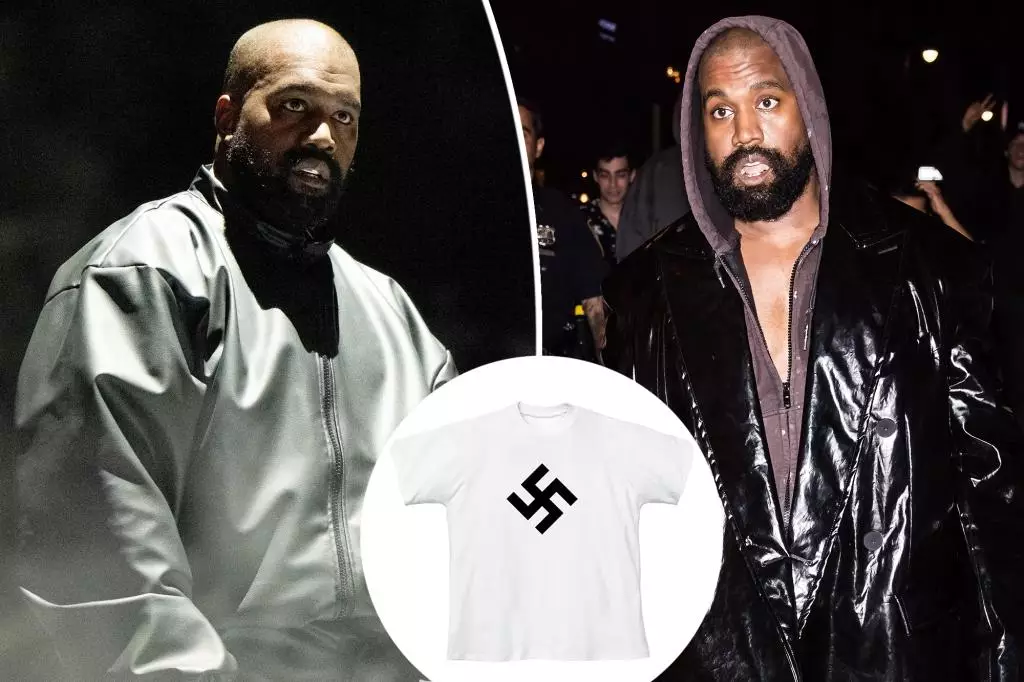Kanye West, who has recently rebranded himself as Ye, has once again sparked outrage following his latest Super Bowl commercial. The ad, which promotes a new T-shirt line on his Yeezy website, features a swastika—a symbol synonymous with hate and antisemitism. This latest act raises profound questions about celebrity responsibility and the extent of the influence that public figures wield in our society.
The T-shirt in question, dubbed “HH-01,” is priced at $20 and has been branded by the Anti-Defamation League (ADL) as a blatant reference to “Heil Hitler.” This decision to promote such a product during one of the most-watched events in America is alarming in itself. Airing only in select cities such as Los Angeles, Philadelphia, and Atlanta, the advertisement leads one to consider the intention behind its restricted release. Was it an attempt to gauge public reaction before a wider rollout, or was it due to apprehensions regarding backlash?
The commercial features West boasting about his low-budget production, humorously noting that he spent the funds earmarked for a more polished advertising approach on a set of new grills instead. This casual demeanor belies the gravity of the matter at hand, which is the repeated glorification of a symbol historically associated with severe oppression and genocidal atrocities.
In the aftermath of the commercial, the ADL issued a rapid condemnation, underscoring the ramifications of West’s public displays of antisemitism. The organization expressed their dismay about how such a prominent platform was co-opted to advertise a product that further entrenches bigotry. They remarked, “As if we needed further proof of Kanye’s antisemitism, he chose to put a single item for sale on his website – a t-shirt emblazoned with a swastika.”
This backlash serves as a critical reminder that while individuals like West may operate with a veneer of artistic expression, the implications of their actions extend far beyond personal artistry. They resonate through public discourse and cultural attitudes, emboldening those who espouse similar hateful ideologies. It raises the question: do celebrities have a moral obligation to wield their influence responsibly, or are they entitled to a license for reckless creative expression?
West’s escapades are part of a broader trend in celebrity culture where controversial actions are often excused under the umbrella of ‘artistic expression’ or ‘freedom of speech.’ However, what tends to be overlooked is the potential harm inflicted upon marginalized communities. West has previously made remarks that echoed his admiration for Adolf Hitler, a notion that many find not only offensive but profoundly distressing.
With social media platforms and television providing a megaphone for statements that perpetuate hate, West’s behavior exemplifies a worrying trend—where shock value is prioritized over conscience. His prior admissions of wanting to create the swastika-adorned T-shirt for years suggest a deliberate engagement with such controversial themes, prompting one to question his awareness of the broader implications of his choices.
The frequency and unabashed nature of his antisemitic remarks, including declarations like “I love Hitler” and “I’m a Nazi,” have given rise to a consequential debate: how should society respond to figures who leverage their influence to further hate? West’s history of making provocative statements raises essential inquiries about accountability and the limits, if any, of celebrity freedom.
Moreover, while West deleted his account on X following the backlash, the damage done within that timeframe is indisputable. His remarks and promoted merchandise have the potential to fuel discord and normalize hatred among susceptible audiences. Public figures, particularly those with such a large following, should be aware of their capacity to impact social attitudes and the need to avoid perpetuating detrimental stereotypes.
Kanye West’s recent actions illustrate a troubling intersection between celebrity influence and societal responsibility. His promotion of a T-shirt emblazoned with a swastika during a high-profile event demonstrates a blatant disregard for the historical and cultural weight of such symbols. As society grapples with the repercussions of celebrity behavior, it becomes increasingly vital to foster discussions on the responsibility of public figures in conveying messages that can either promote understanding or perpetuate division. Addressing these issues head-on is crucial for constructive societal progress, ensuring that platforms for influence prioritize meaningful dialogue over harmful ideologies.
